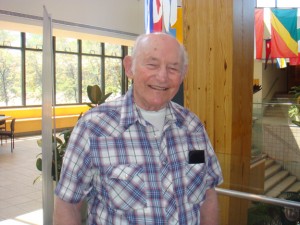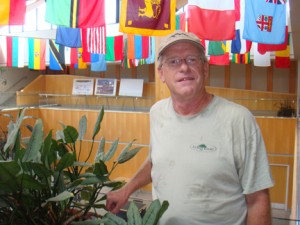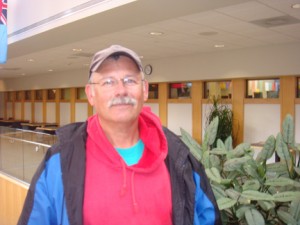Matt Cohen, a graduate of the Peace Corps Master’s International in Forestry, is profiled in the summer 2011 edition of The Public Lawyer for his work as a USAID regional legal advisor in East Africa. In particular, he works to assure that aid monies are properly spent and, in time, reduce governments’ dependence on foreign aid.

Richard (Rick) Judd visited all the way from San Antonio, Florida in June to “check out all the changes” at Michigan Tech and the School of Forest Resources and Environmental Science.
Rick was joined by his wife Karilyn. Rick says, “My lovely wife of 45 years was the one who put me through college and is responsible for me graduating from Michigan Tech in 1969.”
A message to Dean Gale.
I thought your “Message from the Dean” in the current issue of the SFRES magazine was right on the money.
Speaking as an educator, you posed the question ”Are we providing students with the knowledge base they’ll need to address new issues that go beyond what they learned in their formal education?” My own career experience illustrates the importance of being able to do just that, and your recognition of the importance of this key issue speaks well for your program.
I had a 34 year career with the Bureau of Land Management primarily in western Oregon. Michigan Tech prepared me well for my early experiences, once I got used to the differences in scale. I still remember putting in a cluster of inventory plots in a 800-year old stand of Douglas-fir, and cruising a stand of timber on a beautiful riverside terrace that averaged 220,000 board feet per acre. But as my career evolved, I quickly got involved in issues that did indeed go far beyond my formal education.
For most of the latter half of my career, I was the BLM’s Chief of Forestry Planning with responsibilities covering 3,000,000 acres of forest land in Oregon and Washington. These responsibilities included forest inventory, the determination of the sustainable allowable harvest level and oversight of the program to bring that level of timber production to market, and the integration of the forestry program within the land-use planning process.
Early on, the process was relatively simple, and I was guided by the principles and philosophies I learned under Gene Hesterberg, Vern Johnson, and Eric Bourdo in old Hubbell School. Very quickly, however, it became necessary to “go beyond” as you suggest.
One of the first things I had to deal with in this context was the integration of management considerations related to anadromous fisheries. The spawning and rearing streams that salmon and steelhead depended upon were intimately associated with some of our finest timber producing lands. Some of the interactions between fish and timber production were quite subtle, in that relatively minute changes in water temperatures or quality, or the timing or magnitude of stream flows, could have drastic effects on fish production.
Furthermore, it quickly became apparent that the Douglas-fir old-growth seral stage itself was quickly becoming an endangered and scarce resource that needed special handling and management. Hundreds of wildlife species were uniquely dependent upon it, not to mention its importance in more esoteric areas like carbon sequestration and as refugia for mychorrizal fungi.
The point I’m trying to make is that my career quickly moved beyond the specifics I learned in my formal education, but I was able to traverse uncharted waters because of the sound knowledge base and the integrative attitude and adaptive capabilities I acquired at Michigan Tech.
That’s why it is so heartening to read your message. You’ve got the best forestry school in the country on the right trail, Peg. Keep on chuggin’.
Ron Sadler
1957
Great piece on the summer/fall camps in the Fall 2009 issue of the FRES newsletter. I read it with a constant grin on my face remembering the summer of 1968 when I attended camp. I just missed the Alberta experience as it was held on campus that year.
Many of our classes were held in the old Hubbell building. And yes, we had Gene Hesterberg, Bob Sajdak, Mike Coffman, Norm Sloan, Hammer Steinhilb and others as instructors and Glenn Mroz drove the bus. You’ve come a long way, Glenn! We also had a couple of women at our camp. It took Summer Camp for one of them to realize she was claustrophobic when she went in the bush. She switched to biology the very next term .
That camp produced some of the very best times I had while at Tech. I learned more doing those “hands-on” exercises than I would have spending twice the number of hours in a classroom. The experience of the instructors was invaluable and served me well throughout my entire forestry career. I had occasion to work with people who had graduated from other forestry schools that didn’t have a camp and I can tell you that their lack of practical knowledge was very obvious. I had to actually teach a couple of them how to run a compass!!
I can still hear Vern Johnson speaking that famous phrase “C’est la vie” although he pronounced it “Sell a vee” which gave rise to the phrase coined by the students “If you can’t sell a W, sell a V”. Thanks much for including that piece in the newsletter.
William Roehm, who attended Michigan Tech in Forestry in the early 1970s, visited the campus to show his son around. William now lives in Vista, California and is employed by the Oceanside Unified School District.
Stuart Kramer is an Americorps member teaching at an alternative school and running a Community Supported Agriculture (CSA) farm in Eugene, Oregon.


